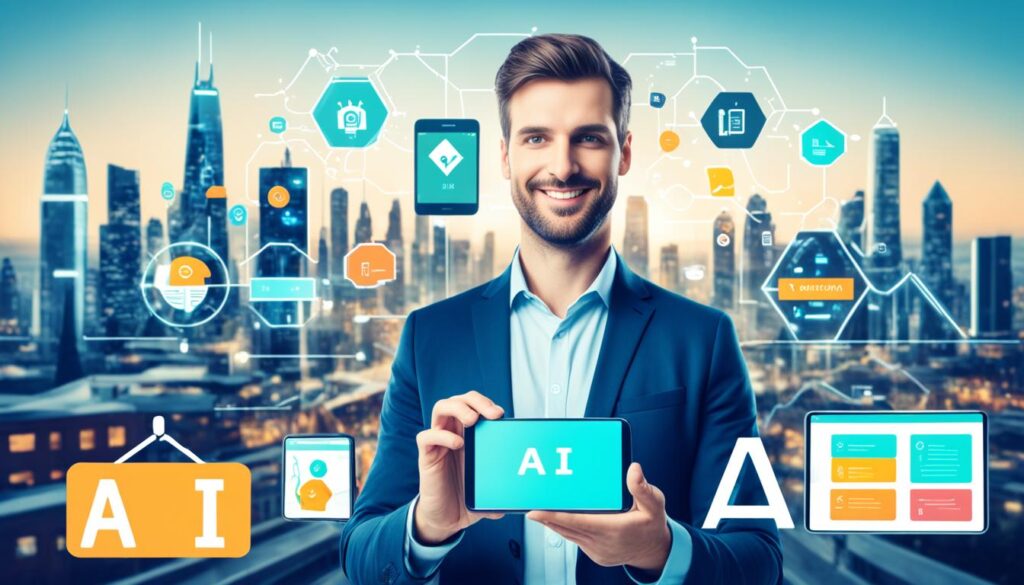How to Use Artificial Intelligence Artificial Intelligence (AI) is reshaping the tech and innovation landscape. It enables machines to mimic intelligent human actions. This technology has spread across various sectors, boosting efficiency and transforming processes. We’ll delve into practical AI applications and strategies for using AI in business and daily life.
Table of Contents

Key Takeaways
- Artificial Intelligence mimics intelligent human behavior.
- AI applications are broad, impacting numerous industries.
- Understanding how to use artificial intelligence can enhance productivity.
- Implementing AI in business can lead to increased operational efficiency.
- Everyday life can also benefit from AI technologies.
- Learners and professionals should grasp best practices in AI usage.
Understanding Artificial Intelligence
Artificial Intelligence, or AI, is a cutting-edge technology aimed at creating systems that mimic human intelligence. At its core, the AI definition covers a spectrum of technologies designed to tackle tasks that demand cognitive abilities like perception, reasoning, and learning. These systems, through their AI capabilities, can sift through vast datasets, adapt to new information, and refine their performance over time.
Understanding artificial intelligence involves grasping several key components:
- Machine Learning: This branch of AI focuses on developing algorithms that enable systems to learn autonomously from data.
- Natural Language Processing: This technology equips machines with the ability to comprehend and respond to human language, thereby improving human-computer interaction.
- Robotics: AI plays a pivotal role in the creation of intelligent robots that can execute tasks in real-world settings.
The growth of AI is broadening its reach across diverse industries, underscoring its adaptability and efficacy. By tapping into vast datasets, AI systems can render decisions and provide insights that exceed human capabilities. This results in streamlined processes and heightened productivity across various sectors.
| AI Components | Description |
|---|---|
| Machine Learning | Algorithms that learn from data and improve over time. |
| Natural Language Processing | Techniques enabling machines to understand human language. |
| Robotics | Integration of AI to create intelligent robots for various tasks. |
What Are the Applications of Artificial Intelligence?
The domain of AI applications is expansive and in constant evolution, touching various sectors and industries. It showcases the technology’s adaptability and potency. In healthcare, AI aids in diagnostics, speeding up and refining patient evaluations. For instance, AI algorithms scrutinize medical images, spotting anomalies that might evade human detection.
In the finance realm, AI plays a crucial role in fraud detection and risk management. Machine learning models scrutinize transaction patterns to pinpoint unusual activities, safeguarding customer assets effectively. Moreover, AI-driven algorithms refine trading strategies, resulting in augmented profits and diminished risks. Pin Code Finder Tool – Blog
E-commerce has undergone significant transformation with AI, especially in personalized recommendation systems. Companies such as Amazon leverage AI to dissect consumer behavior, offering products that resonate with users’ preferences. This innovation boosts customer interaction and sales figures.
The education sector benefits from adaptive learning technologies, tailored to individual student needs and learning paces. Platforms dynamically adjust content delivery based on student performance, ensuring a tailored learning journey.
Transportation is witnessing advancements through AI as well. AI-powered navigation systems deliver real-time traffic updates and optimize route planning. This innovation not only trims travel time but also cuts down on fuel consumption and environmental impact.
AI applications across various sectors highlight its potential to transform numerous fields. By embracing AI technology, entities can streamline operations, elevate customer experiences, and foster innovation.

How to Use Artificial Intelligence in Business
Today, businesses are turning to AI to streamline operations and boost productivity. They use AI for efficiency by tapping into advanced algorithms and data analytics. This not only aids in smarter decision-making but also speeds up information processing. Such efficiency is crucial in a competitive market.
Implementing business intelligence AI applications is key to AI success. These tools offer deep insights from large datasets, helping companies spot trends and make informed decisions. For example, AI-driven predictive analytics can forecast customer needs and streamline inventory management.

Automated customer service solutions are another area where AI makes a big difference. Chatbots and virtual assistants powered by AI can swiftly address customer concerns, enhancing satisfaction and cutting down on costs. By automating routine tasks, companies can redirect employee efforts to strategic projects.
To showcase AI’s practical benefits, consider this table that highlights its effects on various business areas:
| Business Process | Without AI | With AI |
|---|---|---|
| Customer Support | Long response time, high staffing costs | Immediate responses, lower costs |
| Data Analysis | Manual analysis, high error rate | Automated analysis, higher accuracy |
| Marketing Campaigns | Generic targeting, lower engagement | Personalized targeting, higher ROI |
In conclusion, using AI for efficiency leads to better decision-making, improved customer service, and notable cost savings. Companies embracing these technologies can gain a competitive advantage in their fields.
AI Technology Solutions for Various Industries
AI technology solutions are now vital across many fields, showing their power in making processes more efficient and improving decision-making. Various sectors are using AI applications designed for their specific needs and challenges.
In healthcare, AI helps diagnose illnesses earlier than before. It analyzes vast amounts of data to tailor treatment plans for each patient. This integration of AI in healthcare boosts efficiency and enhances patient outcomes.
The finance industry greatly benefits from AI. It uses advanced algorithms to detect fraud and manage risks more effectively by quickly processing large datasets. These tools are key to keeping financial operations secure and efficient.
In manufacturing, AI is crucial for quality control. Predictive maintenance models prevent machine failures, which increases productivity and cuts downtime. This shows how AI is transforming various sectors.

As technology advances, so will AI. Companies across all industries must stay adaptable and open to adopting new industry-specific AI applications. This will help them remain competitive and innovative.
| Industry | AI Application | Benefits |
|---|---|---|
| Healthcare | Diagnosis and Treatment Personalization | Improved patient outcomes, early detection |
| Finance | Fraud Detection and Risk Management | Enhanced security, optimized operational efficiency |
| Manufacturing | Quality Control and Predictive Maintenance | Increased productivity, reduced downtime |
| Retail | Customer Behavior Analysis | Targeted marketing, improved sales strategies |
How to Use Artificial Intelligence: Best Practices
Effective AI implementation hinges on adhering to best practices that boost success. Key elements involve meticulous data management. This ensures high-quality, relevant data feeds into AI systems. Moreover, continuous training of AI models is crucial. It enhances performance by adapting to new information and evolving trends.
Defining clear objectives for AI initiatives is vital for measuring success and aligning with business goals. Companies must prioritize ethical AI usage. This means building systems with fairness, accountability, and transparency in mind. Engaging stakeholders during the AI development process helps build trust and address potential biases.
- Data Management: Maintain clean and relevant datasets to support accurate outputs.
- Continuous Learning: Regularly update AI models to adapt to new data.
- Objective Setting: Clearly outline the goals of AI projects to guide development.
- Engagement: Involve diverse groups to address potential ethical issues.
- Transparency: Ensure clear processes so stakeholders understand AI decisions.

The Role of Machine Learning Tools in AI Implementation
Effective AI implementation hinges on a strong foundation of machine learning tools. These tools are crucial for analyzing vast data sets and uncovering deep insights. By employing advanced algorithms, businesses can refine their AI strategies and make decisions backed by data.
Machine learning tools play a pivotal role in AI deployment, covering data preparation, model training, and evaluation. They automate mundane tasks, freeing up human resources for more strategic tasks. Companies that adopt these tools often see marked improvements in efficiency and innovation.
Here are the key advantages of using machine learning tools in AI strategies:
- Enhanced predictive analytics to forecast customer behavior
- Improved decision-making grounded in data-driven insights
- Increased adaptability to market changes through real-time data analysis
- Streamlined operations that reduce costs and optimize resource allocation
In today’s competitive environment, making data-driven decisions is vital. Organizations that leverage machine learning can not only keep up with industry trends but also lead in innovation and customer satisfaction.

Leveraging Artificial Intelligence in Everyday Life
Artificial Intelligence has woven itself into the fabric of our daily lives, reshaping how we tackle personal tasks and activities. The surge in personal AI use has brought about significant time management benefits and simplified various processes. This integration has made our lives more efficient and streamlined.

Devices such as smart speakers and personal assistants have brought forth everyday AI applications. These tools employ voice recognition to carry out commands, from fetching information to controlling home devices with ease. Users find the AI’s assistance invaluable, whether it’s setting reminders or checking the weather with just a voice command.
The growth of AI has also influenced smart home technology. These devices, powered by AI, not only boost energy efficiency but also ensure safety. For instance, smart thermostats can discern user habits and adjust temperatures accordingly. Home security systems leverage AI to spot unusual patterns, alerting homeowners promptly.
Consider the following table highlighting some common everyday AI applications:
| AI Application | Functionality | Benefits |
|---|---|---|
| Personal Assistants (Siri, Alexa) | Voice-activated commands | Hands-free convenience, task management |
| Smart Thermostats | Energy usage optimization | Cost savings, personalized comfort |
| Smart Security Systems | Surveillance and alerts | Enhanced safety, real-time monitoring |
| AI Fitness Apps | Personalized workout plans | Improved motivation, tailored fitness |
As AI continues to evolve, its impact on improving our quality of life is set to expand. It will further embed technology into our daily lives, empowering us to become more adept in our personal pursuits.
Deep Learning Algorithms: A Key Component of AI
Deep learning algorithms are essential in AI technology, leveraging complex neural networks to delve into vast datasets. These algorithms feature multiple layers of interconnected nodes. This setup enables them to identify intricate patterns within the data.
One of the standout benefits of deep learning algorithms is their ability to abstract. By mimicking the human brain, these neural networks can automatically extract features. This eliminates the need for manual feature engineering, boosting AI system performance across various domains.
The influence of deep learning is vast, touching many sectors. For example:
- Computer Vision: These algorithms are adept at image classification and object detection. They enable systems to swiftly identify and categorize visual content.
- Speech Recognition: They play a key role in interpreting spoken language, enhancing the precision of voice-activated devices.
- Medical Diagnosis: AI technology employs deep learning to analyze medical images. This aids in the early detection of diseases through pattern recognition.
- Autonomous Vehicles: Deep learning is crucial for autonomous vehicles. It helps them navigate by processing real-time data from their environment.
The following table highlights the main distinctions between traditional machine learning and deep learning algorithms:
| Aspect | Traditional Machine Learning | Deep Learning Algorithms |
|---|---|---|
| Data Requirements | Smaller datasets | Large datasets |
| Feature Extraction | Manual feature selection | Automatic feature extraction |
| Complexity | Less complex models | Highly complex models |
| Training Time | Shorter training times | Longer training times |

Optimizing AI Performance: Strategies for Success
In today’s fast-paced tech world, making AI perform better is crucial for companies wanting to boost productivity. At the heart of this effort is the drive to enhance AI effectiveness. Essential strategies help push forward AI systems, keeping them dependable and efficient.
Key methods to reach these aims include:
- Data Quality Enhancement: High-quality data is the bedrock for precise AI algorithms. Ensuring data’s integrity and relevance directly affects AI system efficiency.
- Regular Model Updates: Updating AI models regularly with new data enables them to evolve with new knowledge, significantly enhancing their abilities.
- Performance Monitoring: Strong performance monitoring tools help pinpoint areas for improvement. This ensures algorithms are continually refined.
- Adaptive Algorithms: Creating algorithms that learn from new data dynamically boosts AI performance by increasing precision and speed.
By adopting these strategies, companies can create an environment that focuses on optimizing AI performance and aligns with goals for improving AI effectiveness. As AI reshapes operational norms, a proactive stance on enhancing systems is essential for staying competitive.

AI Implementation Strategies for Small Businesses
Implementing AI for small businesses can revolutionize operations and boost efficiency. Many affordable AI solutions are now within reach, making it simpler for small enterprises to adopt these technologies. This accessibility is crucial for small businesses aiming to stay competitive.
Developing successful AI implementation strategies hinges on a deep understanding of the business’s needs. Identifying areas where AI can add significant value, such as marketing automation or customer support, is essential. For example, AI-driven analytics tools can empower businesses to make data-driven decisions, thereby enhancing productivity.
Below are key steps for small businesses to consider when implementing AI:
- Assess current operational processes to identify areas of improvement.
- Research affordable AI solutions suitable for your business size and industry.
- Start with pilot projects to gauge effectiveness before full-scale implementation.
- Train employees extensively on new tools to maximize their potential.
- Regularly evaluate the impact of AI on business processes and ROI.

With meticulous planning and execution, small businesses can unlock the full potential of AI. This leads to sustained growth and a competitive edge in the market.
| AI Tool | Description | Expected Benefit |
|---|---|---|
| Chatbots | Automated customer service tools | Increased responsiveness and customer satisfaction |
| Predictive Analytics | Tools for forecasting trends and customer behavior | Better strategic decisions and planning |
| Email Automation | Automated email marketing campaigns | Enhanced engagement and conversion rates |
AI in Healthcare: Transforming Patient Care
The integration of AI in healthcare marks a significant leap forward in patient care technology. This new approach improves care quality and operational efficiency, ushering in an era of precision in treatment protocols. AI now aids in diagnosing diseases, analyzing vast patient data, and tailoring treatment plans to individual needs.
Industry leaders like IBM Watson Health have developed tools that can sift through extensive medical literature and patient information. These systems empower healthcare professionals to make swift, informed decisions, thereby enhancing patient outcomes.

AI adoption in healthcare goes beyond streamlining processes; it shifts the focus to preventive care by identifying risk factors early. The table below highlights popular AI applications in healthcare and their contributions:
| AI Application | Functionality | Impact on Patient Care |
|---|---|---|
| Predictive Analytics | Analyzes historical data to predict health outcomes | Early identification of at-risk patients |
| Diagnostic Imaging | Enhances image analysis through machine learning | Improved accuracy in detecting anomalies |
| Telemedicine | Facilitates remote consultations using AI tools | Increased accessibility to specialist care |
| Robotic Surgery | Assists surgeons with precision tasks | Reduced recovery time and surgical risk |
As healthcare evolves, the incorporation of AI technologies promises a bright future for patient care. Embracing these innovations can revolutionize health service delivery, leading to improved patient experiences and outcomes.
AI in Marketing: Enhancing Customer Engagement
Artificial Intelligence (AI in marketing) is transforming how companies connect with their audience. It uses sophisticated algorithms to sift through vast customer data, offering a deeper understanding of consumer behavior. This knowledge is crucial for crafting customer engagement strategies that resonate deeply with each individual.
AI’s role in marketing is pivotal, especially in personalizing interactions. By tailoring content, offers, and communications to match individual interests, companies can significantly enhance the customer experience. This personal touch not only strengthens brand loyalty but also elevates overall satisfaction levels.
AI-driven tools are essential in segmenting customer data, uncovering patterns and trends. Let’s delve into how these tools are instrumental in shaping successful marketing campaigns:
| AI-Driven Tool | Benefit | Application Example |
|---|---|---|
| Predictive Analytics | Forecasts customer behavior | Targeted email campaigns based on purchase history |
| Chatbots | Improves customer service | 24/7 assistance for queries and problem resolution |
| Sentiment Analysis | Measures customer satisfaction | Feedback analysis from social media and reviews |
Integrating these AI technologies not only simplifies marketing but also enhances efficiency in reaching out to consumers. By engaging customers with personalized experiences, trust and loyalty are built. This, in turn, propels sales and growth.

Conclusion
The future of AI is brimming with potential, promising to transform both personal and professional spheres. As companies delve into the vast applications of AI, they’re finding it enhances operational efficiency and customer experiences. This underscores the critical need for businesses to swiftly adapt to these advancements.
For those committed to grasping AI, the benefits are immense. By leveraging AI, firms can refine decision-making and uncover innovative solutions to complex issues. This summary highlights the significance of leading in technological evolution, ensuring competitiveness in a fast-changing market.
Looking forward, embracing AI technology is imperative for enduring growth. AI’s integration will likely intensify, playing a crucial role in future progress and resilience. Those who strategize well will excel in tomorrow’s business landscape.
FAQ
What is Artificial Intelligence (AI)?
Artificial Intelligence (AI) involves systems or programs that mimic human intelligence by learning from experiences. It uses techniques like machine learning and deep learning. These methods allow systems to adapt and improve over time.
How can businesses effectively implement AI?
Businesses can implement AI effectively by managing data well, training AI models continuously, and setting clear goals. They should also consider ethical aspects of AI applications. This ensures AI technology maximizes business efficiency.
What are some real-world applications of AI?
AI is used in healthcare for diagnostics and personalizing treatments. In finance, it helps manage risks and detect fraud. In e-commerce, it provides personalized recommendations to improve customer experience.
How can small businesses adopt AI technologies?
Small businesses can adopt AI by using affordable solutions like AI-driven analytics and automation tools. These tools focus on specific areas like marketing or customer service. This significantly boosts productivity and ensures a good return on investment.
What role do machine learning tools play in AI?
Machine learning tools are essential in AI as they help systems analyze data patterns and make informed decisions. They learn from new data, improving operational efficiencies.
How does AI optimize performance in various applications?
AI optimizes performance by improving data quality, updating models regularly, and monitoring performance continuously. This leads to increased accuracy, reliability, and user satisfaction.
What is the significance of deep learning algorithms?
Deep learning algorithms are crucial in AI, using neural networks to analyze large datasets. They facilitate advancements in computer vision and speech recognition. Applications include identifying diseases in medical images and powering autonomous vehicles.
How is AI transforming healthcare?
AI is transforming healthcare by improving patient care and operational efficiency. It assists in diagnosing diseases, analyzing patient data, and customizing treatment plans. This leads to better healthcare outcomes.
What are the benefits of AI in marketing?
AI benefits marketing by analyzing customer behavior and facilitating tailored communications. It uses predictive analytics for data segmentation, enhancing engagement and boosting conversion rates.



